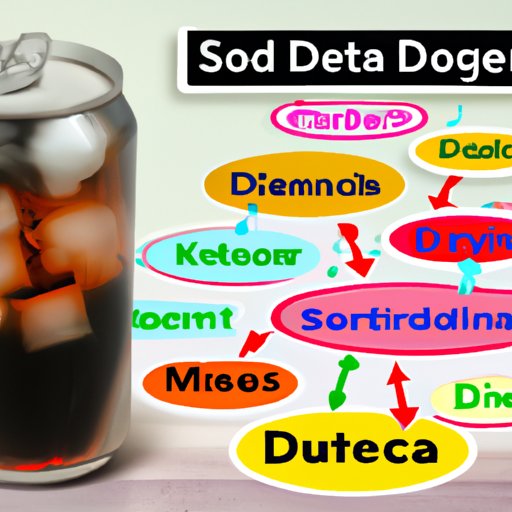
Introduction
Diet soda is a popular beverage among those who are health-conscious or trying to lose weight. With no or low calories and no sugar, it seems like the perfect alternative to regular soda, which is high in sugar and calories. However, recent studies have shown that despite the lack of calories, drinking diet soda could actually contribute to weight gain. This paradox has left many people confused and looking for answers. In this article, we explore the potential reasons behind this paradox and provide insights into how to make informed choices for your health.
The Paradox of Diet Soda: Can Drinking Low-Calorie Beverages Make You Gain Weight?
The paradox of diet soda and weight gain refers to the phenomenon where individuals who consume low-calorie beverages like diet soda end up gaining more weight than those who drink regular soda or avoid soda entirely. This phenomenon has puzzled researchers for years and has led to conflicting conclusions about the link between diet soda and weight gain.
Several studies have examined the potential association between diet soda consumption and weight gain. A study published in the American Journal of Clinical Nutrition followed over 3,600 participants for eight years and found that those who drank diet soda had a higher risk of becoming overweight or obese than those who didn’t. Another study published in the Journal of Obesity followed over 2,500 participants for ten years and found that diet soda consumption was associated with a higher risk of abdominal obesity.
So, why does this paradox exist? One possible explanation is that drinking diet soda can stimulate appetite and lead to overeating. When you consume something sweet, your body expects calories to follow. When those calories don’t come, your body can become confused and signal hunger, which leads to overeating. Another possible explanation is that diet soda can alter the gut microbiome, which can lead to weight gain.
Breaking Down the Ingredients: How Diet Soda Can Affect Your Metabolism and Weight
While diet soda has fewer calories than regular soda, it still contains several artificial sweeteners, flavors, and preservatives that can negatively impact your metabolism and contribute to weight gain. Artificial sweeteners like aspartame, sucralose, and saccharin can disrupt the body’s natural ability to regulate calorie intake and hunger signals, leading to overconsumption and weight gain.
Moreover, artificial sweeteners have been linked to changes in gut bacteria, which can affect energy metabolism and contribute to weight gain. Studies have shown that artificial sweeteners can increase the population of harmful gut bacteria associated with obesity, inflammation, and metabolic disorders.
Why Your Diet Soda Habit Might Be Doing More Harm Than Good
Many people view diet soda as a healthier alternative to regular soda. However, research suggests that diet soda may not be the healthier choice after all. Beyond weight gain, diet soda has been linked to several negative health effects, such as an increased risk of chronic diseases like Type 2 Diabetes, heart disease, and stroke. Additionally, the artificial sweeteners in diet soda have been linked to dental erosion and cavities.
Furthermore, drinking diet soda can lead to an increase in appetite and a decrease in metabolism, both of which can contribute to weight gain. A study published in the journal Nature found that consuming artificial sweeteners can disrupt the body’s natural energy regulation system, leading to overconsumption and weight gain.
The Link Between Diet Soda and Overeating: Breaking the Cycle to Achieve Your Health Goals
The link between diet soda and overeating is complex and multifactorial, but breaking this cycle is essential for achieving your health goals. One strategy is to replace your diet soda with healthier alternative beverages like water, sparkling water, tea, or coffee. If you’re looking for something sweet, try adding a slice of fruit to your water or choosing a natural, low-calorie sweetener like stevia.
Another strategy is to practice mindfulness when consuming any beverage or food. Slowing down while eating or drinking and focusing on the flavors, textures, and smells can increase satisfaction and decrease the likelihood of overeating. Finally, practicing portion control and balancing your diet with healthy, nutrient-rich foods can help break the cycle of overeating and promote a healthy weight.
The Truth About Diet Soda and Weight Loss: What the Science Says
Despite conflicting conclusions in the research, the evidence suggests that drinking diet soda is not an effective strategy for weight loss. A study published in the Journal of the Academy of Nutrition and Dietetics found that overweight and obese adults who consumed diet beverages regularly consumed more calories overall than those who consumed regular beverages.
On the other hand, other studies suggest that there is no link between diet soda consumption and weight gain or that individuals may experience weight loss when replacing regular soda with diet soda. Therefore, the relationship between diet soda and weight is still under investigation, and more research is needed to determine how diet soda affects metabolism, appetite, and weight regulation.
Conclusion
The paradox of diet soda and weight gain has left many people confused about their beverage choices. While research has shown a potential link between diet soda and weight gain, more research is needed to determine the exact reasons for this paradox. Nevertheless, it’s clear that consuming diet soda can have negative effects on physical health, metabolism, and weight. Therefore, it’s essential to consider the potential risks when choosing which beverage to consume and to make informed choices for your long-term health goals.





